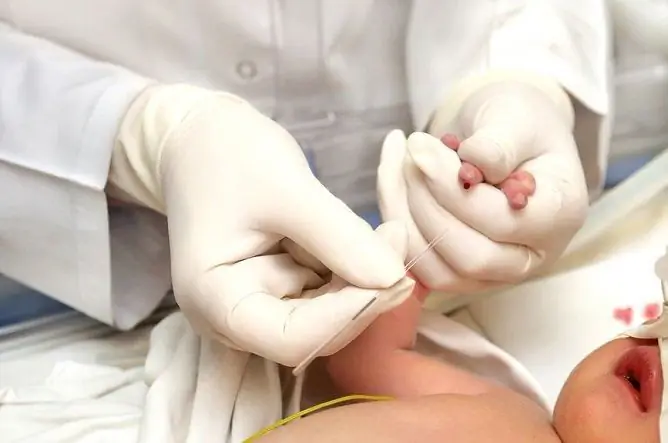- Author Rachel Wainwright wainwright@abchealthonline.com.
- Public 2023-12-15 07:39.
- Last modified 2025-11-02 20:14.
Leukocytes in newborns

White blood cells, which play a major role in protecting the human and animal body from external and internal pathogenic agents, are called leukocytes.
Although white blood cells are considered white blood cells, they are actually colorless cells. Their size ranges from 6 to 20 microns, leukocytes can be round or irregular, their characteristic feature is the ability to move freely, like unicellular organisms.
There are several types of white blood cells, but they all perform similar functions - they protect the body from antigens, harmful foreign substances, dead cells and organisms.
The range of total leukocyte count in newborns is normally from 9 to 30 x 109 / L of blood, in adults, the content of white blood cells should be from 4 to 9 x 109 / L.
In medical practice, it is customary to distinguish between two types of white blood cells in the blood, namely:
- Granular leukocytes or granulocytes, the cytoplasm of which has granular particles. Depending on the color of the cytoplasmic grains, they are subdivided into neutrophils, eosinophils and basophils. Depending on the shape of the nucleus, neutrophils are divided into segmented and stab leukocytes;
- Non-granular leukocytes or agranulocytes, in the cytoplasm of which there are no granular particles. They are usually subdivided into monocytes and lymphocytes.
Due to the fact that each of the above types of white blood cells performs a strictly defined function, changing the total number of leukocytes in the blood of a newborn is an important clue when making a diagnosis.
Elevated white blood cells in a newborn
As mentioned above, the total number of leukocytes in newborns is normally from 9 to 30 x 109 / l, which is 1000 times higher than this figure for an adult. Such a high level of white blood cells remains in the body of the crumbs for several weeks, after which it begins to gradually decrease.
If the level of leukocytes has not begun to decline, then, most likely, the crumbs' body is fighting some kind of infection or harmful bacteria. Thus, increased white blood cells in a newborn may indicate:
- Injuries;
- Diseases;
- Blood loss;
- Infections.
The reasons for the increase in the number of leukocytes in newborns can be:
- Overgrowth of leukocytes in the blood;
- Increased blood viscosity;
- Diseases of the mother during pregnancy;
- Increased formation of leukocytes in the red bone marrow.
A high content of white blood cells in the blood is called leukocytosis, which, in turn, is divided into physiological, absolute, neutrophilic, basophilic, distributive, eosinophilic and monocytosis.
Treatment of an elevated white blood cell count in newborns consists primarily of treating the underlying infection. Usually, doctors prescribe antibiotics to the baby, which quickly relieve symptoms, but the real restoration of white blood cells is a long process.
Decreased leukocytes in the blood of a newborn
A condition in which the number of leukocytes in newborns or adults is below normal is called leukopenia. It is often a sign of suppression of the production of new white blood cells in the bone marrow and is observed in conditions such as:
- Oncological diseases with bone marrow metastases;
- Hypersplenism;
- Anemia, the occurrence of which is caused by a lack of vitamin B12;
- The initial stage of development of leukemia;
- Systemic lupus erythematosus;
- Aplastic, hypoplastic and viral diseases;
- Radiation sickness.
Also, a decrease in leukocytes in newborns may be the result of exposure to ionizing radiation or taking certain medications.
Leukocytes in the urine of a newborn
Normally, the content of white blood cells in urine should correspond to 0 to 10 leukocytes per 1 μl. An increased content of leukocytes in the urine, first of all, is evidence of inflammatory processes, the location of which is the kidneys, urinary system or genitals. The doctor can make a specific diagnosis based on the analysis of the urine of the newborn, carried out using special equipment.
Basically, an increased content of leukocytes in the urine of a newborn child is accompanied by symptoms such as:
- Violation of urination - increased frequency or containment;
- Increased tearfulness of the crumbs when urinating (as it may hurt);
-

Elevated leukocyte count in urine in a newborn Change in the color and consistency of urine (the appearance of a cloudy sediment);
- Fever or chills
- Nausea and vomiting.
Usually, diseases associated with the urinary system, in particular with the bladder, are easily cured. The doctor prescribes a course of taking antibiotics, which relieve symptoms and help the baby's body quickly recover. After treatment, it is important to re-analyze the urine in order to fully verify the success of the measures taken.
The leukocyte count in blood and urine in newborns is a clear indicator of how healthy or sick a baby is. From the first days of the baby, it is important for parents to monitor the hygiene of the baby, strengthen its immunity and pay special attention to the appearance of any deviations in its behavior and state of health. Any disease diagnosed at an early stage is easier to treat than in an advanced form.
YouTube video related to the article:
Found a mistake in the text? Select it and press Ctrl + Enter.






